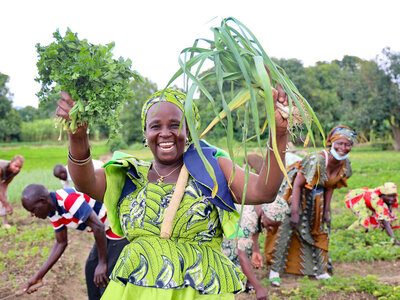Cameroon
- 2.9 million
- people need humanitarian assistance
- 29%
- of children under 5 are stunted (impaired development due to malnutrition)
- 29.4+ million
- forcibly displaced persons
Cameroon is classified as lower-middle-income country and ranks 155th out of 193 countries on the 2025 Human Development Index. A country of 29.4 million people, is the world's most neglected displacement crises. Years of conflict, climate shocks, and economic pressure have left 2.9 million people in need of humanitarian assistance, with over 2.2 million forcibly displaced people on the move as internally displaced persons, refugees, returnees, and asylum seekers.
Insecurity linked to the Lake Chad Basin conflict, the North-West and South-West socio-political crisis, and the influx of refugees from the neighbouring Central African Republic and Nigeria continues to erode livelihoods, weaken food systems, and limit access to basic services, directly affecting Cameroon’s six out of the ten regions.
Food insecurity remains widespread. According to the October 2025 Cadre Harmonisé, the situation is expected to remain severe through the next lean season, with nearly 2.9 million people projected to face crisis and emergency levels of food insecurity, including around 250,000 people in emergency conditions. At the same time, over 6.2 million people are expected to remain under pressure and highly vulnerable to further shocks.
Protection risks are acute. Women and girls face heightened exposure to gender-based violence. Poverty deepens these risks, with 23 percent of Cameroonians living below the international poverty line.
Without urgent funding, more than half a million of the most vulnerable people risk losing food and nutrition assistance from the beginning of 2026. To sustain life-saving operations and prevent further deterioration in 2026, WFP urgently requires USD 156 million.
What the World Food Programme is doing in Cameroon
-
Emergency response
-
WFP provides unconditional life-saving food assistance to populations affected by shocks such as violent conflict and the effects of climate change and pandemics, including refugees, internally displaced persons (IDPs), returnees and vulnerable host communities in Adamawa, East, Far North, North, North West and South West regions. WFP’s support ensures safe access to adequate and nutritious food during and after crises, while supporting recovery from and building resilience to shocks.
-
Early recovery and resilience
-
Addressing malnutrition
-
Support to smallholder farmers
-
Capacity strengthening
-
UN Humanitarian Air Service (UNHAS)
Cameroon news releases
Go to pagePartners and donors
Find out more about the state of food security in Cameroon
Visit the food security analysis pageOperations in Cameroon
Contacts
Office
P.O. Box 7308, Rue Giscard, Estaing, Face Cercle Municipal
Yaoundé
Cameroon







